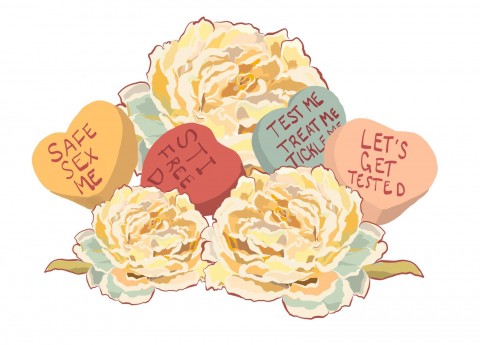You’ve been seeing someone new. Things are going great. You like them a lot. They’re incredibly attractive. It’s finally time to have that uncomfortable but important conversation — no, not about defining the relationship — about getting tested for STIs.
 Sexually transmitted infections are infectious diseases that are spread from person to person through any type of sexual contact. Some of the most common STIs include chlamydia, gonorrhea, genital herpes, syphilis and hepatitis B. Anyone who is sexually active could potentially contract an STI, and some can even be transmitted in many non-sexual ways. Many STIs are treatable but can have negative health effects if left undetected and untreated.
Sexually transmitted infections are infectious diseases that are spread from person to person through any type of sexual contact. Some of the most common STIs include chlamydia, gonorrhea, genital herpes, syphilis and hepatitis B. Anyone who is sexually active could potentially contract an STI, and some can even be transmitted in many non-sexual ways. Many STIs are treatable but can have negative health effects if left undetected and untreated.
Despite living in a world that loves to talk about sex, we’re really uncomfortable talking about sexual health — even with the people we’re banging. According to a 2017 survey conducted by Cosmopolitan and Esquire magazines, 47 per cent of millennials reported that none of their past partners had asked about their STI-test results.
Although STIs are extremely common amongst young people — the American Sexual Health Association reports that about half of sexually active people will contract an STI by age 25 — we’re not asking our partners to get tested nearly as much as we should.
In a perfect, sex-positive world, asking the people you’re sleeping with about their STI history would be easy. In reality, it can be an extremely difficult conversation to have, even with someone you know and trust. There’s still a lot of negative stigma associated with STIs, and sexual health is often regarded as a taboo topic.
Talking about STIs is one of the most important and positive things you can do for any sexual relationship. By starting the conversation early, you and your partner will be better equipped to deal with any potential problems you might encounter. Prevention is key, here!
Asking your partners to get tested — or having them ask you — has nothing to do with cheating or mistrust. Not only are STIs super common, they’re also extremely hard to detect. Many STIs — including chlamydia, gonorrhea, HPV and hepatitis B — can be present in a person’s system without any obvious symptoms, although the likelihood of displaying symptoms can depend on the person’s biological sex. This means you could have an STI for a long time and not know it.
Even though it’s a very clinical topic, asking your partner about STI testing can actually be really, really sexy. You’re showing your partner that you care about their well-being and the well-being of your relationship.
Students can access free and confidential STI testing at a number of locations in Saskatoon, including the Student Wellness Centre at the University of Saskatchewan, Saskatoon Sexual Health, OUTSaskatoon and the public Sexual Health Clinic on Idylwyld Drive.
While it’s recommended that everyone get tested regularly, you should also get tested if you’ve had unprotected sex, if you have multiple sexual partners and with each new partner you have.
Talking about STIs might never be the easiest thing to do, but it doesn’t have to be impossible. Prevention, trust and communication are the keys to having safe sex. And, regardless of what type of sex you’re having or with whom, we can all agree that safe sex is the best kind of sex.
—
Emily Klatt
Graphic: Jaden Pierce
Leave a Reply